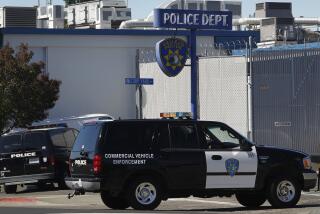Teledyne to Pay $112 Million in 2 Whistle-Blower Suits
- Share via
WASHINGTON — Teledyne settled two major civil fraud suits brought by the Justice Department and four whistle-blowers for $112.5 million, the second-highest such settlement in defense industry history, the government announced Thursday.
Under a deal negotiated over recent months, Teledyne will pay $85 million to settle charges that its relays subsidiary in Hawthorne sold the Pentagon millions of improperly tested electronic relays, and $27.5 million to settle charges that its systems unit in Northridge padded contracts on aircraft electronics equipment.
Since the late 1980s, Teledyne has pleaded guilty three times to a broad range of federal felony charges and has faced half a dozen civil fraud suits--a startling series of legal problems that surpassed those of much larger defense firms.
With the two settlements Thursday, Teledyne will have made substantial progress in pulling itself out of the legal quagmire that has damaged its reputation at the Pentagon, forced it to lay off employees and reduced its profits.
“There is some sense of satisfaction and relief to have these cases resolved,” said Teledyne President Donald Rice. “It is an important milestone getting these major cases resolved, having the financial uncertainty resolved and allowing us to focus more of our time on the business.”
The $112.5-million settlement is just the latest fortune extracted from the defense industry through the federal False Claims Act, which allows whistle-blowers to sue contractors on behalf of the government and share in the recovery.
The stunning series of recent awards, including the $150 million paid by United Technologies earlier this month, are likely to continue, experts say. As with many other cases, the Teledyne suits were filed in the late 1980s, shortly after amendments to the federal law in 1986 strengthened the hand of whistle-blowers.
The early cases are nearing a conclusion and the resulting damages are dwarfing the civil settlements historically won by the federal government. The industry, clearly stunned, is exerting pressure on Congress to limit whistle-blowers by amending the law.
“It is a serious problem,” said LeRoy Haugh, a vice president at the Aerospace Industries Assn., a trade group. “It hasn’t bankrupted anybody so far, but at some point it could be the difference of staying in business and not staying in business.”
But whistle-blowers and their attorneys argue that the large awards are the very reason not to weaken the law.
“The awards are so big only because they are based on the amount of money that was stolen in the first place,” said Phillip Benson, a Newport Beach attorney who represented one of the whistle-blowers in the systems unit case.
The large rewards also reflect the substantial resources that private law firms representing whistle-blowers commit to the cases, often surpassing the money and time that the Justice Department can commit.
John Phillips, who represented whistle-blowers in both of Teledyne’s cases, said his firm had spent 20,000 hours in supporting the Justice Department in the cases.
Under terms of the settlement, Teledyne will pay half of the $112.5 million damages before the end of this year and the balance in two equal installments next year. The whistle-blowers in the cases will receive between 15% and 25% of the awards, subject a federal judge’s ruling on the award.
In addition to the $85 million civil settlement, Teledyne has previously paid a $17.5-million criminal fine for the illegal testing of relays and an additional $3.1 million in an administrative settlement with the Pentagon. Teledyne also must pay $4.6 million to the whistle-blowers’ attorneys.
The $112.5-million settlement will be charged against the company’s first-quarter earnings, resulting in an after-tax loss of $55.1 million.
The allegations in the relays case were made by Emil Stache and Almon Muehlhausen, two employees at Teledyne’s plant in Hawthorne. They alleged that Teledyne improperly tested 8 million to 10 million relays, which are tiny switches used in a variety of jets, missiles, spacecraft and other systems.
Rice said that there is no allegation or evidence that any relay failure has caused any damage in military operations.
The allegations in the systems case were made by Klaus Kirchhoff and Max Killingsworth, who alleged that executives at the Northridge plant routinely padded contracts by adding illegal “negotiation yields” that would provide a cushion in cutting prices during contract negotiations.
Although the settlement closes the book on the two cases for Teledyne, it is expected that the private attorneys and whistle-blowers in the case will be fighting in court for some time over the division of attorneys fees and the award.
More to Read
Inside the business of entertainment
The Wide Shot brings you news, analysis and insights on everything from streaming wars to production — and what it all means for the future.
You may occasionally receive promotional content from the Los Angeles Times.









